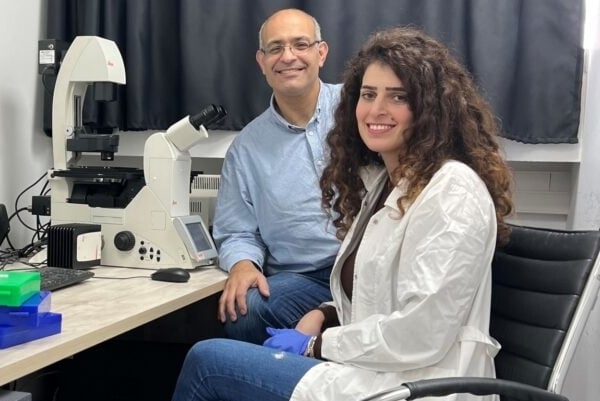In some patients, cancer breaks out more aggressively after chemo, even in cases where it successfully shrinks the initial tumor.
By Abigail Klein Leichman, Israel21c
Surprisingly, chemotherapy for cancer sometimes leads to metastasis, the main cause of cancer deaths.
A study from the medical school of the Technion – Israel Institute of Technology sheds light on the mechanisms behind this paradox.
The article was chosen as the cover story in Cancer Research.
Prof. Yuval Shaked and doctoral student Jozafina Haj-Shomaly, who led the study, emphasized that existing cancer treatments are highly effective and in many cases save lives.
However, in some patients, the disease breaks out more aggressively after chemo, even in cases where it successfully shrinks the initial tumor.
The researchers focused on the development of metastases in lung tissue following chemotherapy for breast cancer. About 30 percent of patients treated conventionally for early-stage breast cancer develop metastases within a few months or years as cancer cells travel via the lymphatic system to organs such as the lungs, liver and bones.
Shaked’s research group discovered in previous studies that LOX, a common enzyme that affects tissue configuration, makes lung tissue more hospitable to cancer cells. Inhibiting the activity of LOX significantly reduces the ability of cancer cells to attach to lung tissue.
The current study found that in response to chemotherapy, high amounts of LOX are secreted from specific immune system T cells.
“Following the changes that the T cells and the LOX enzyme cause in this medium, it begins to help the cancer cells grow, survive, move, divide and cling to each other,” said Shaked.
“Moreover, it can block the entry of normal immune cells and even anti-cancer drugs into the malignant region.”
Although the study was conducted in a breast cancer model in mice using the chemo drug Paclitixel, the researchers assume their findings will be relevant to other drugs and cancers.
“We were surprised to find that the mechanisms of action we discovered, which encourage the development of cancerous metastases, are activated not only in response to surgeries as previously found, but also in response to chemotherapy and other drugs that we are currently investigating,” said Haj-Shomaly.
“Our achievement – the detection of the mechanism that causes a structural change in health by the immune system – may enable the development of combined drugs and treatments that prevent this phenomenon and reduce the chances of developing metastases,” said Shaked.
The study was supported by the U.S.-Israel Binational Science Foundation, European Research Council and Israel Science Foundation.
Bring Purim Joy to Israeli Victims of War and Terror
Join us in providing Israeli victims of war and terror with much needed comfort, blessing and holiday joy.
Families have been destroyed by the horrific Hamas massacre of October 7th and ongoing terror and rockets attacks. There are so many orphans that need our love, compassion and support!
Brighten their Purim holiday by sending Purim food baskets, yummy treats, personal notes and toys for the children.
CLICK HERE TO SEND YOUR PURIM GIFT & PERSONAL NOTE TO THE VICTIMS



